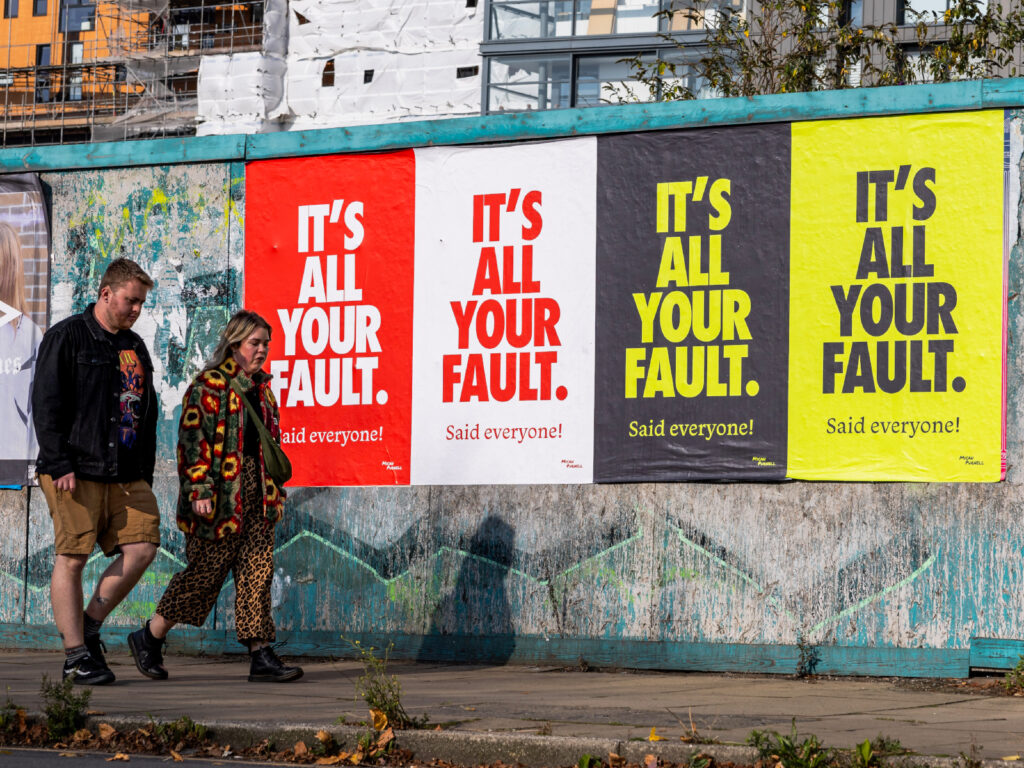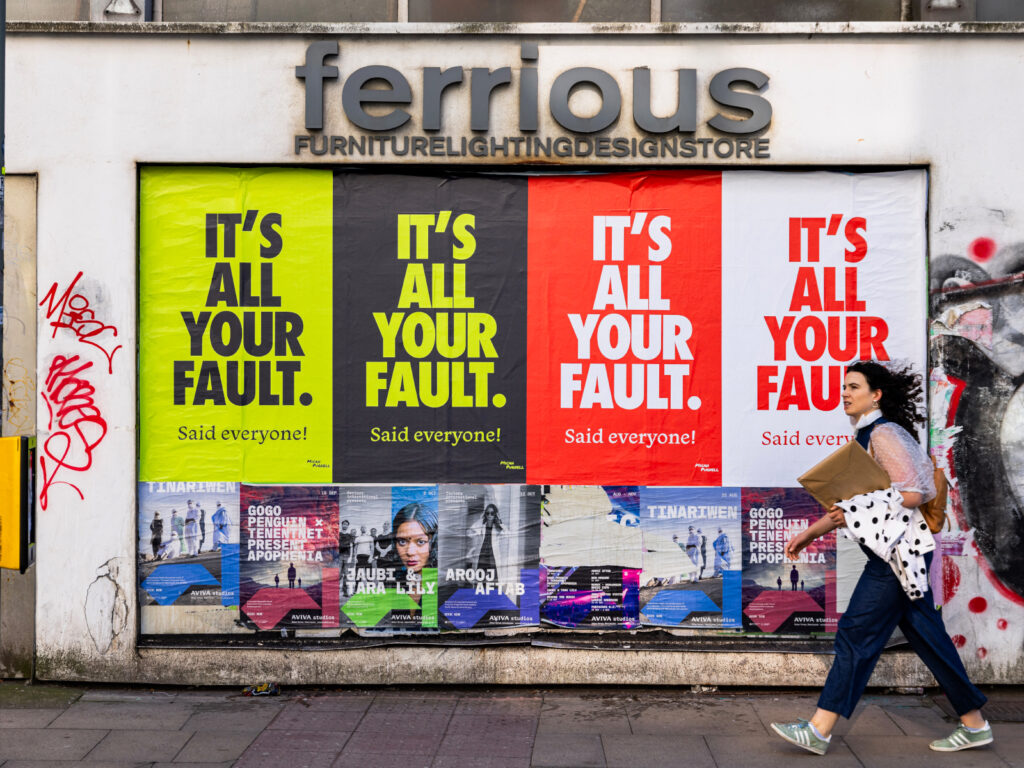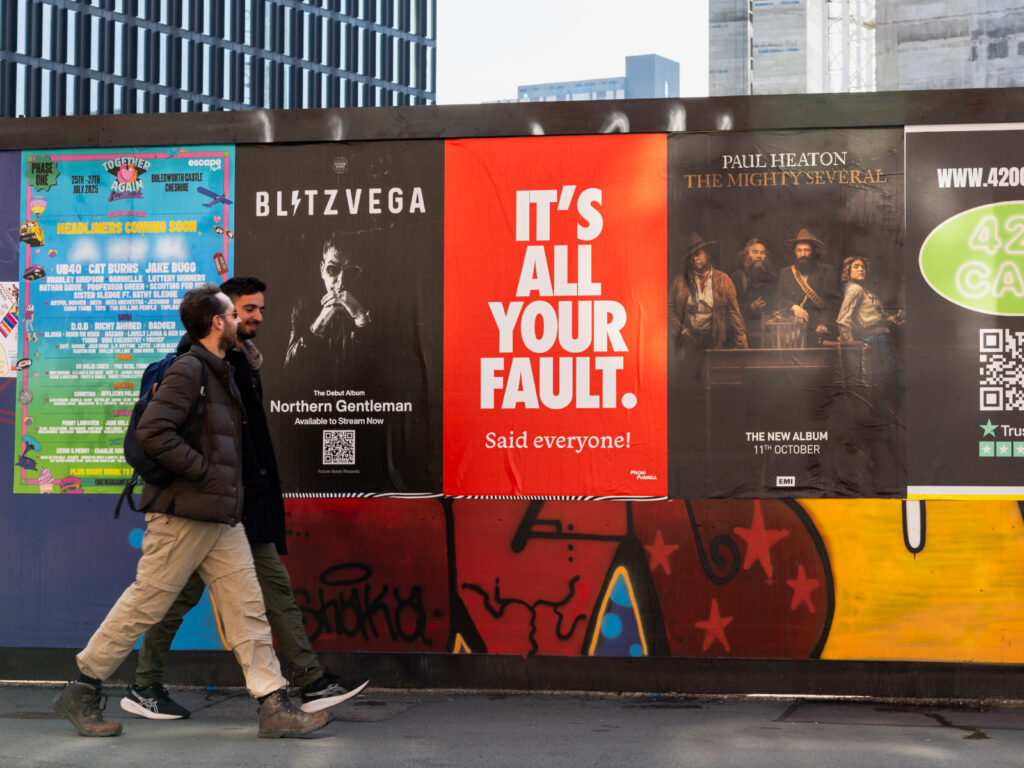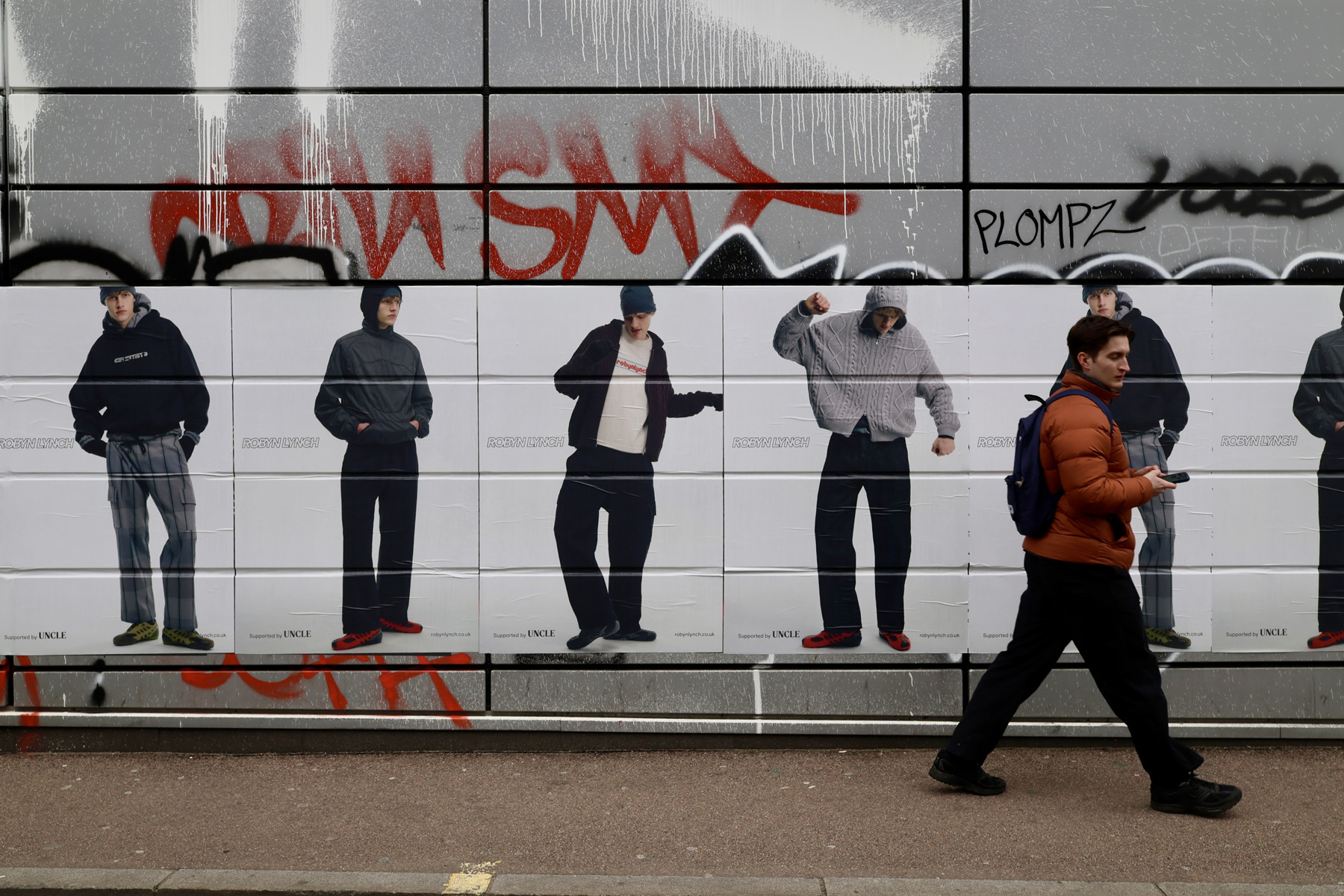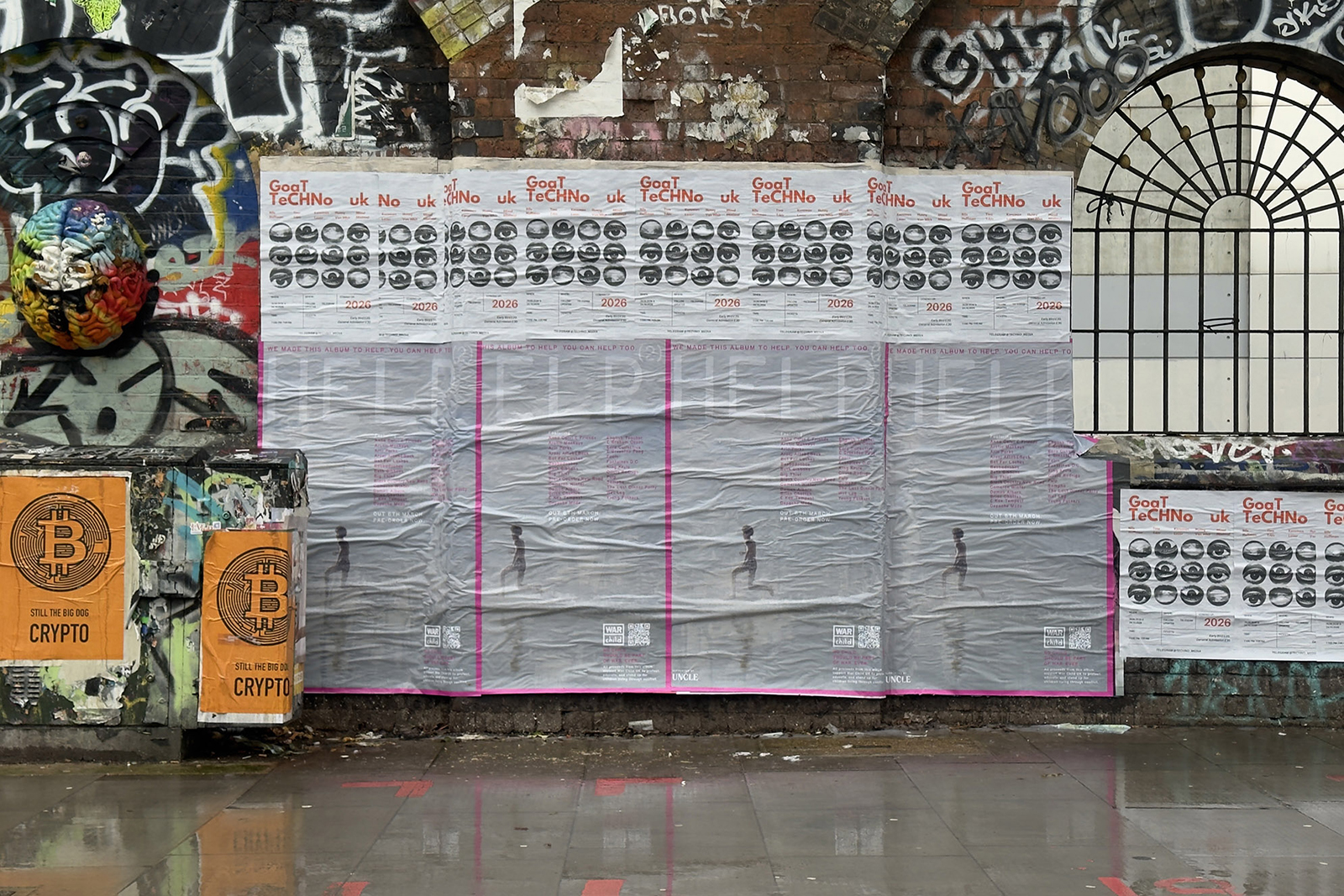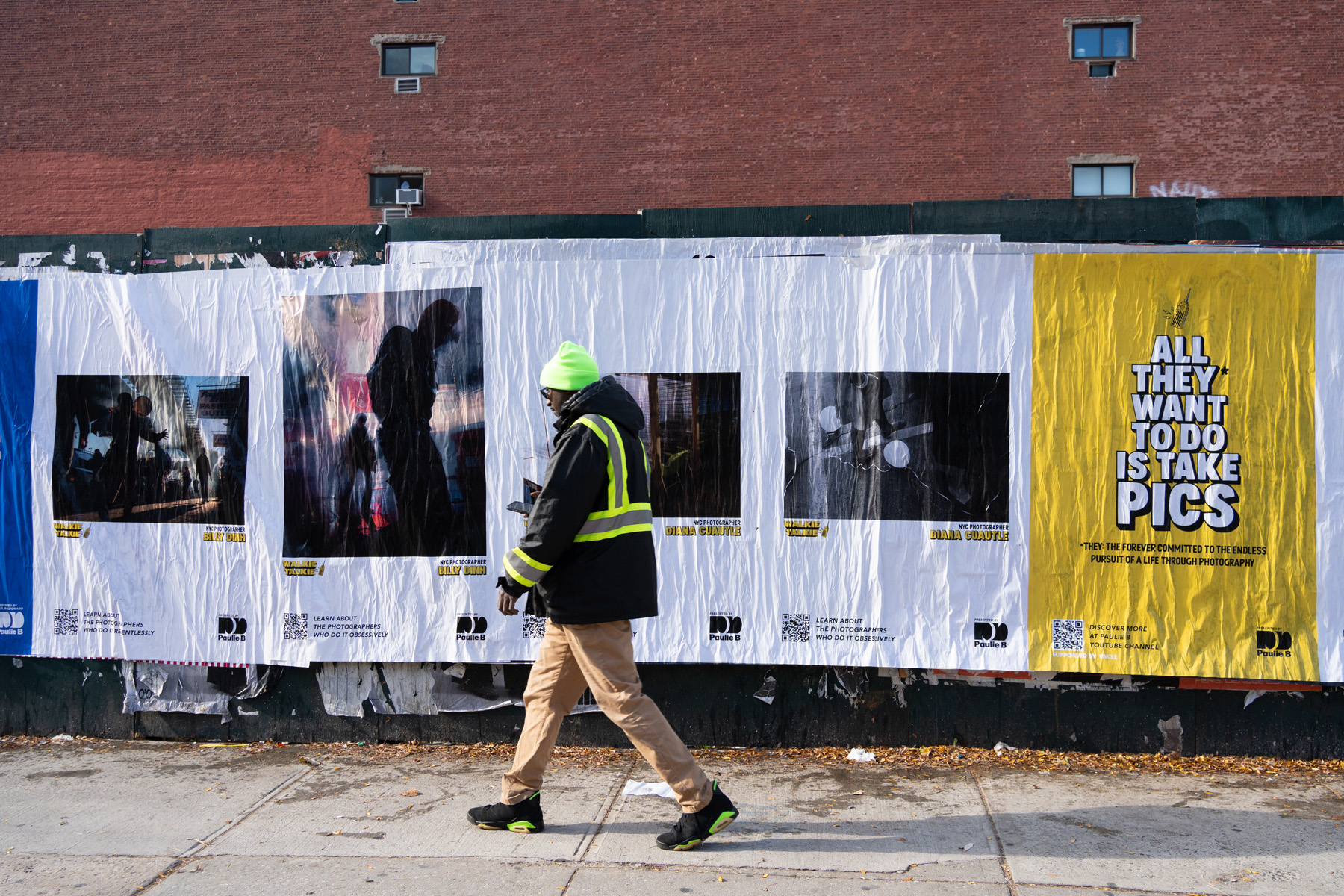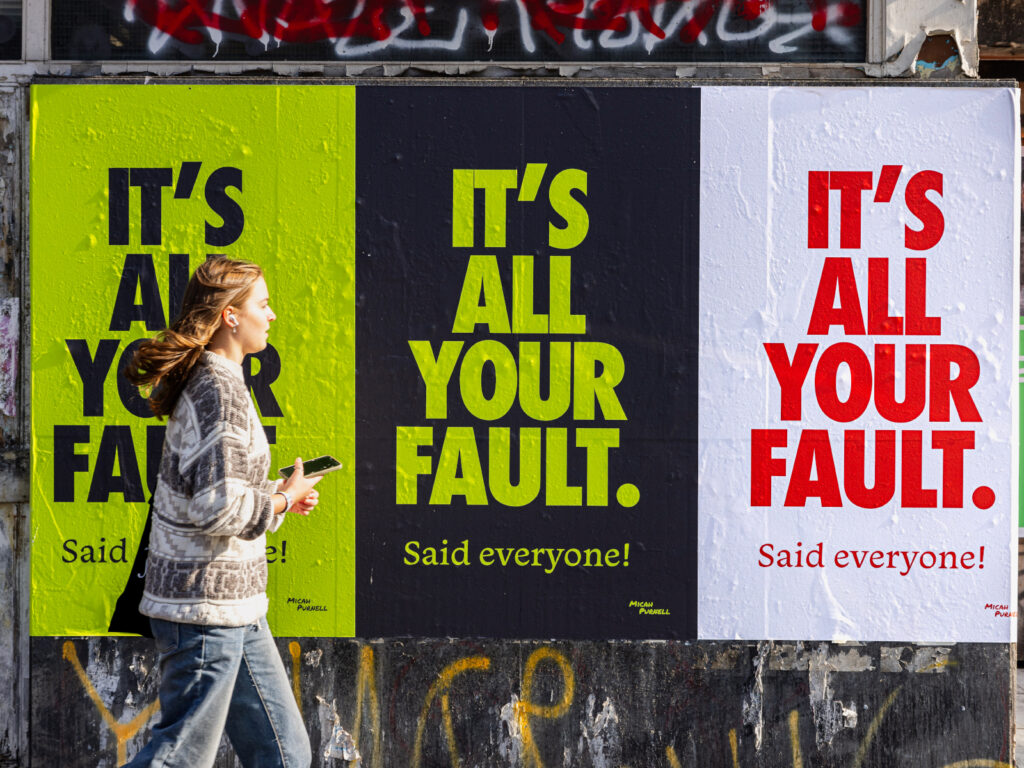
Micah Purnell is a Manchester-based artist known for combining bold visuals with thought-provoking messages that challenge societal norms. With a background deeply rooted in club culture aesthetics and spiritual themes, his work explores complex ideas such as blame culture and collective responsibility. Through public art installations and campaigns, he aims to provoke reflection and dialogue in everyday spaces, bringing artistic and philosophical ideas into public consciousness. UNCLE partnered with him on his latest campaign, which prompts people to look inward and examine their own role in perpetuating scapegoating, encouraging personal accountability.
As an artist, Purnell is inspired by everything from religious scripture to modern advertising, blending the two to create unique pieces that engage both visually and intellectually. He draws influence from the city of Manchester itself, where urban and political environments have shaped much of his creative journey. With notable projects that span from Guardian magazine covers to stadium installations, Purnell seeks to bring meaning to the places where people are most likely to encounter them. This campaign in particular cleverly uses humour and bold design to create a conversation about collective responsibility while gently challenging people to reconsider their own attitudes and behaviours. By doing so, Purnell hopes to inspire a shift toward greater self-awareness, empathy, and ultimately, a more harmonious society.
In this interview, we discuss the concept behind his recent series in more detail and delve into the development of his work over time, inspirations, and how Manchester has played a role in shaping his creative vision. Through this conversation, Purnell offers insights into the larger cultural and philosophical ideas that influence his art, as well as his hopes for the public’s reception of his latest campaign.
WHAT IS THE CONCEPT SURROUNDING THIS SERIES OF WORK?
The idea is a surprising, funny, yet relevant piece, in bold capital letters and strong colours initially appearing as a brazen statement declaring ‘IT’S ALL YOUR FAULT’, assigning blame on the reader, but with the punchline ‘Said everyone!’ Retracting all blame. To a degree.
WHY IS THE SLOGAN ‘IT’S ALL YOUR FAULT. SAID EVERYONE!’ FEATURED SO PROMINENTLY?
The phrase is used as a device to create a public or internal conversation about blame culture and scapegoating.
HOW HAS THIS SERIES OF WORK DEVELOPED OVER TIME?
The theme is part of my ongoing thinking around scapegoat theory, which is an early psychoanalytic idea that explains how individuals or groups project their own frustrations, anxieties, fears or destructive tendencies onto another convenient group or target. It’s a defence mechanism of unconscious denial by projecting one’s own pain, turned into blame, onto others.
WHAT DOES THE CAMPAIGN AIM TO ADDRESS?
The scapegoat is in fact innocent, but highlights the trauma in those scapegoating. The philosopher René Girard believes that if someone has a revelation of, or is confronted with the knowledge of their own scapegoating, then they can no longer do so, so easily, it can break the cycle. Jung said, ‘If people were aware of what they were doing, they would not scapegoat, since the idea of punishing people for crimes they have not committed deeply offends our ethical sense.’
TELL US ABOUT SOME OF THE MOST PROMINENT MOMENTS IN YOUR CAREER?
Producing work for a Guardian magazine cover and Wembley Stadium are major highlights of my commercial career because my drive has always been to bring the humanities to public spaces. Public spaces are the places where people are, but commercial motives dominate.
WHAT IMPACT DOES THE CITY OF MANCHESTER HAVE ON YOUR WORK?
Late 90’s club fly poster aesthetics mixed with the black and white spiritual and political slogans at the Friends Meeting House on Mount Street gave birth to what I continue to do in the same city today. Urban settings have given more space up to a counter consumer narrative thanks to the likes of Uncle and others.
I myself have managed to create an ongoing dialogue with the public via three purpose-built art boards named Add-Art (www.addart.gallery) housed by those willing to risk for the sake of a better city. This is what makes Manchester the place to be. There’s room for us all and people are willing to take risks.
WHAT ARTISTS INSPIRE YOU?
As pointed out above, this is twofold. For the meaning and content, a lot of my work was early readings of the wisdom scriptures in the Bible, in the likes of Ecclesiastes and Proverbs. Contemporary influences have to be the likes of Barbara Kruger, Jenny Holzer, and Douglas Coupland. However, when it comes to visuals, I love football and sports advertising. Nike and Adidas both have superb advertising agencies creating thoughtful advertising (albeit to line their pockets). I love the idea of using the visuals and skill of advertising and mixing them with meaningful themes to push humanity further, to dig deeper, and be more forgiving of one another.
WHAT ARE SOME HIDDEN GEMS IN MANCHESTER YOU LOVE? / FAVOURITE THING ABOUT LIVING IN MANCHESTER?
People are the hidden gems. When you’ve time to stop and see all that goes on, the support to push on solidifies a healthy, defiant drive towards a better world. And of course, the drive is the end game, there is no completion, it’s in the doing, in the small productive ways that make things possible.
DOES CULTURE PLAY A KEY PART IN YOUR CREATIVITY?
I think it has to, but I’m so involved I’m unaware of how it comes out in my work. I aim to foster a DIY culture in others. All too often, one can feel the need to wait for the money, the resources, the tools, the space, the backing, the permission to go forward. You should push on with what you have, however minuscule. Whatever you want for the future, you need to be willing to design it now, in whatever minuscule way, because these things have a tendency to grow. Every tiny act in the right direction is a seed towards it. And through it, you hone your craft. Through this unconscious method, I have been supported, encouraged, financed, and published without pushing, applying or asking — there is a time for pushing doors, but generosity provokes generosity, so just crack on.
WHAT DO YOU HOPE PEOPLE TAKE AWAY FROM THIS CAMPAIGN?
I hope it’s received as a light-hearted bit of matey, fun-poking banter — that we’re all culpable to, and when we own our own, we’re closer to harmony.

